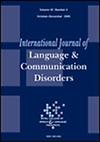A survey of current practice for post-acute stroke patients with cognitive impairment requiring nasogastric feeding—A proposed management pathway
Abstract
Background
Dysphagia is a common complication of stroke, and enteral feeding is often necessary. If present, cognitive impairment can complicate the process of reintroducing oral intake. There is limited evidence concerning the outcomes of enteral feeding with this particular patient group and decision-making can be challenging when considering long-term feeding options.
Aims
To consolidate best practice and begin working towards developing a pathway for patients with cognitive impairment and dysphagia.
Methods & Procedures
A survey was conducted among post-acute stroke units in Wales to determine current practices and identify variations in the management of this patients group. We invited all stroke rehabilitation units that were part of a stroke-specific pathway in Wales to participate (n = 9).
Outcomes & Results
Of the seven units that provided data, we identified great variety in experience and practice. Conversion to oral intake varied from 21.3% to 81.8% and to eating and drinking with acknowledged risk varying from 0.0% to 66.7%. Only one centre had a pathway specifically tailored to cognitively impaired nasogastric (NG)-fed patients.
Conclusions & Implications
This heterogeneity in practice and experience highlights a need to develop formal pathways for the weaning of NG feeding with these patients. Any variation in patient outcomes for those with both cognitive impairment and dysphagia compared with those unaffected need to be explored. We present a model pathway for conversion from NG feeding for patients with cognitive impairment. We also propose future work to develop a patient-centred evidence base to inform practice for patients with dysphagia and cognitive impairment post-stroke.
WHAT THIS PAPER ADDS
What is already known on the subject
- There is limited research on how to achieve the best outcome for patients with stroke and coexistent cognitive impairment. Clinical experience of the authors would suggest that the dated evidence around appetite and NG feeding might need to be updated to allow the prospect of swallowing recovery in this group to be optimized.
What this paper adds to the existing knowledge
- There is often uncertainty in cases of post-stroke survivors who have cognitive impairment about how best to approach the scenario of feeding if dysphagia exists. This pathway incorporates the current guidance and recommendations in a structured way with a practical approach to the weaning of parenteral feeding to allow those guidelines to implemented as intended.
What are the potential or actual clinical implications of this work?
- There is a possibility that the implementation of this pathway in to clinical practice will ensure that healthcare professionals working with post-stroke survivors who have cognitive impairment can offer a patient-centred, holistic management plan.

 求助内容:
求助内容: 应助结果提醒方式:
应助结果提醒方式:


